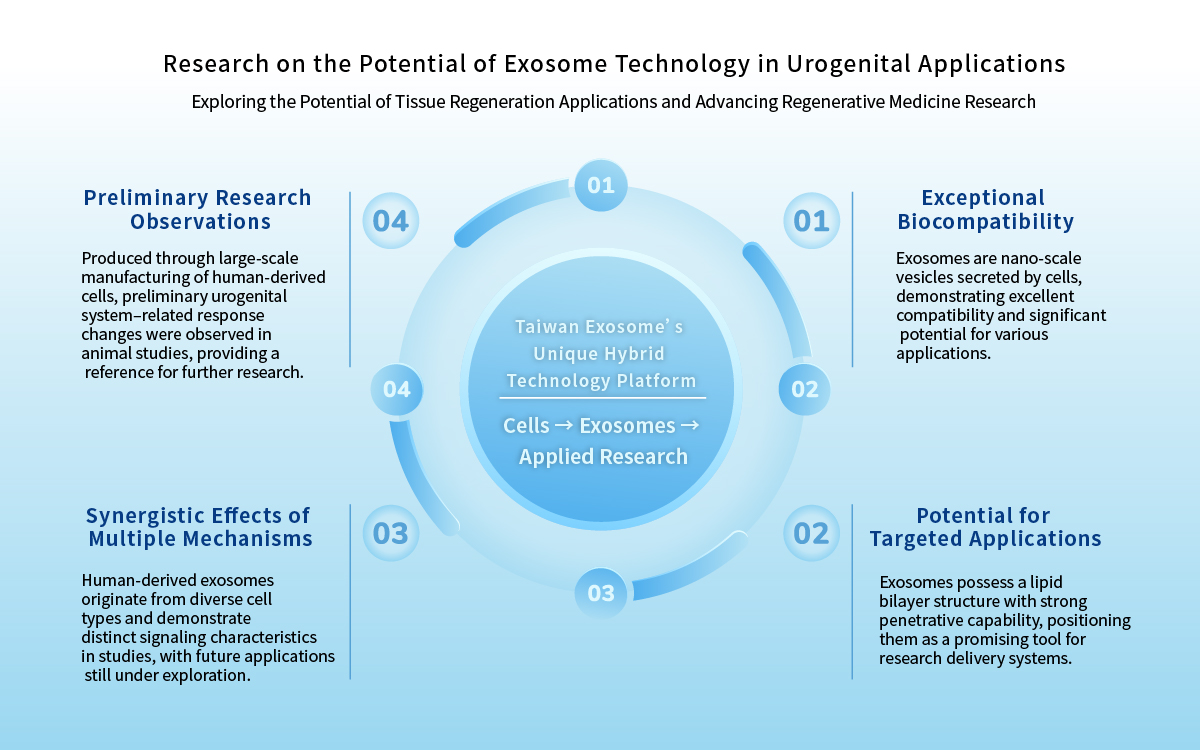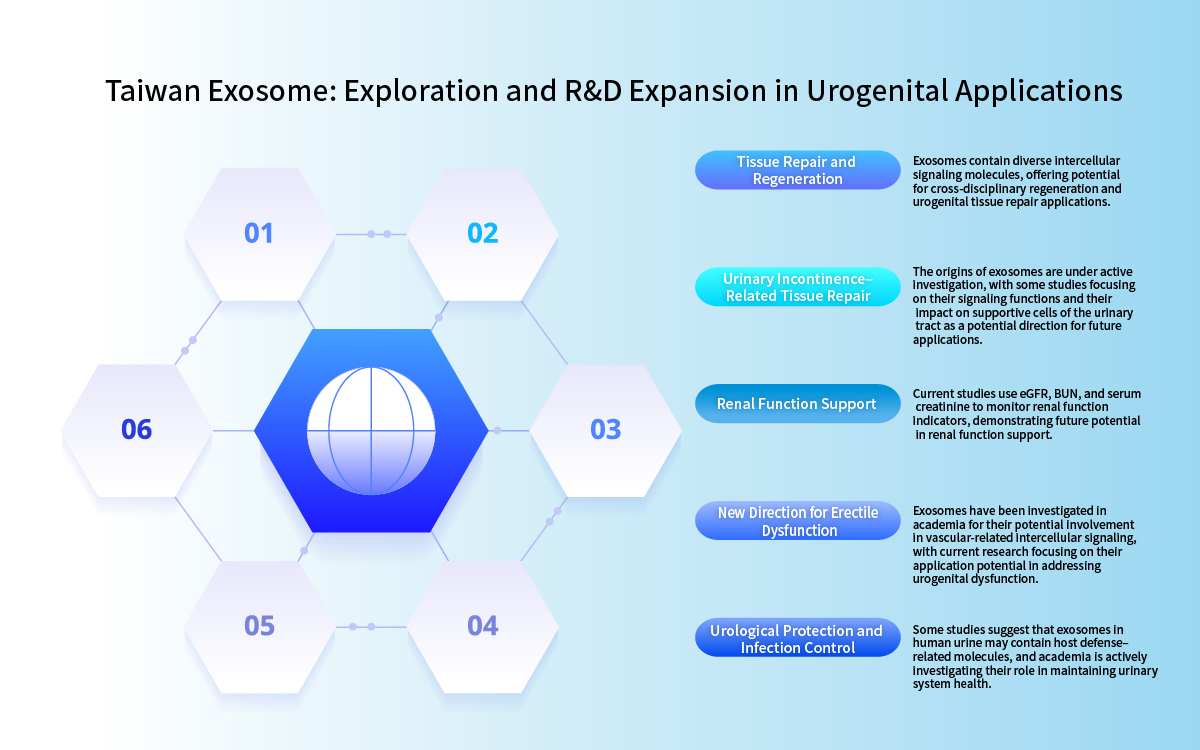2025/09/19
Editorial Column
Miniature Couriers Between Cells! Taiwan Biotech Startup Targets Urological Applications to Pioneer Regenerative Medicine
Reporter: Yu-Hsuan Chang – September 17, 2025
Did you know? Trillions of human cells communicate through a miniature delivery system—exosomes, nanoscale vesicles acting as nature’s couriers. They are rapidly emerging as one of the brightest rising stars in global biotechnology. Taiwan Exosome Co., Ltd. today announced that it will leverage this cutting-edge technology to focus on urological and reproductive applications research.

Unveiling the Mystery of Exosomes: Nature’s Messengers Between Cells
Like factories sending couriers, cells release exosomes carrying proteins and RNA as “instructional cargo” to relay signals. Taiwan Exosome has mastered the technology to mass-produce exosomes from multiple cell types (including stem cells) and has established GTP-compliant production systems to ensure quality and consistency.
Targeting Urological and Reproductive Health: Early Research Shows Promise

Why focus on the urological and reproductive fields? Because the health of kidneys, the bladder, and reproductive systems is critical to quality of life, with rapidly growing market demand. Early-stage animal studies have already shown promising results, providing valuable insights for future R&D.
Future Health Screening Trend: Detecting Early Risks with a Simple Urine Test
Exosomes show strong potential as diagnostic and monitoring tools. When health abnormalities occur, the “messages” carried by urinary exosomes change—for example, specific microRNA (miRNA) markers are closely associated with urological diseases. This points toward non-invasive, personalized early detection through simple urine testing.
Policy Support: Taiwan’s Advantage in the Global Exosome Market
Taiwan is among the few Asian countries with legislation for regenerative medicine. The passage of the Regenerative Medicine Development Act clearly regulates exosomes, paving the way for research and clinical trials. Taiwan Exosome aims to leverage this policy advantage to advance technology applications and explore local development potential. The global exosome market for urological and reproductive applications is projected to grow from USD 20.6 million in 2024 to over USD 120 million by 2035, with the broader market expected to exceed USD 3 billion by 2030.
Agile Business Strategies to Accelerate Adoption
To expedite industrial applications, Taiwan Exosome is implementing a diverse business strategy, including:
CDMO Services: Supporting pharmaceutical companies in manufacturing clinical-grade exosomes.
Technology Licensing: Partnering internationally to expand applications.
Patent Collaborations: Engaging in cross-licensing with top domestic and global teams.
Co-Development: Working with academic institutions and pharma companies to advance drug research and commercialization.
Outlook: Building Global Potential
Taiwan Exosome plans to complete revenue deployment by 2026, expand international licensing and disease applications by 2028, and aims to become a key global influencer in exosome technology by 2030, driving Taiwan’s biotech innovations onto the world stage.
Did you know? Trillions of human cells communicate through a miniature delivery system—exosomes, nanoscale vesicles acting as nature’s couriers. They are rapidly emerging as one of the brightest rising stars in global biotechnology. Taiwan Exosome Co., Ltd. today announced that it will leverage this cutting-edge technology to focus on urological and reproductive applications research.

Unveiling the Mystery of Exosomes: Nature’s Messengers Between Cells
Like factories sending couriers, cells release exosomes carrying proteins and RNA as “instructional cargo” to relay signals. Taiwan Exosome has mastered the technology to mass-produce exosomes from multiple cell types (including stem cells) and has established GTP-compliant production systems to ensure quality and consistency.
Targeting Urological and Reproductive Health: Early Research Shows Promise

Why focus on the urological and reproductive fields? Because the health of kidneys, the bladder, and reproductive systems is critical to quality of life, with rapidly growing market demand. Early-stage animal studies have already shown promising results, providing valuable insights for future R&D.
Future Health Screening Trend: Detecting Early Risks with a Simple Urine Test
Exosomes show strong potential as diagnostic and monitoring tools. When health abnormalities occur, the “messages” carried by urinary exosomes change—for example, specific microRNA (miRNA) markers are closely associated with urological diseases. This points toward non-invasive, personalized early detection through simple urine testing.
Policy Support: Taiwan’s Advantage in the Global Exosome Market
Taiwan is among the few Asian countries with legislation for regenerative medicine. The passage of the Regenerative Medicine Development Act clearly regulates exosomes, paving the way for research and clinical trials. Taiwan Exosome aims to leverage this policy advantage to advance technology applications and explore local development potential. The global exosome market for urological and reproductive applications is projected to grow from USD 20.6 million in 2024 to over USD 120 million by 2035, with the broader market expected to exceed USD 3 billion by 2030.
Agile Business Strategies to Accelerate Adoption
To expedite industrial applications, Taiwan Exosome is implementing a diverse business strategy, including:
CDMO Services: Supporting pharmaceutical companies in manufacturing clinical-grade exosomes.
Technology Licensing: Partnering internationally to expand applications.
Patent Collaborations: Engaging in cross-licensing with top domestic and global teams.
Co-Development: Working with academic institutions and pharma companies to advance drug research and commercialization.
Outlook: Building Global Potential
Taiwan Exosome plans to complete revenue deployment by 2026, expand international licensing and disease applications by 2028, and aims to become a key global influencer in exosome technology by 2030, driving Taiwan’s biotech innovations onto the world stage.
